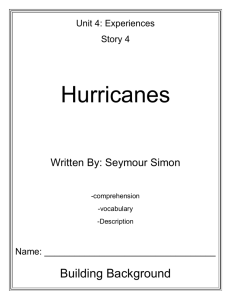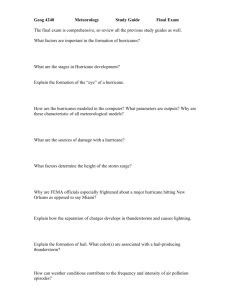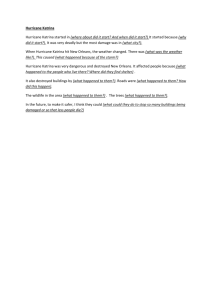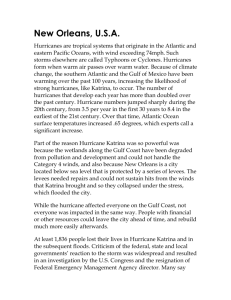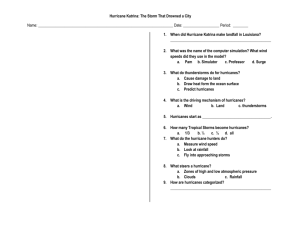Expert pitch
advertisement
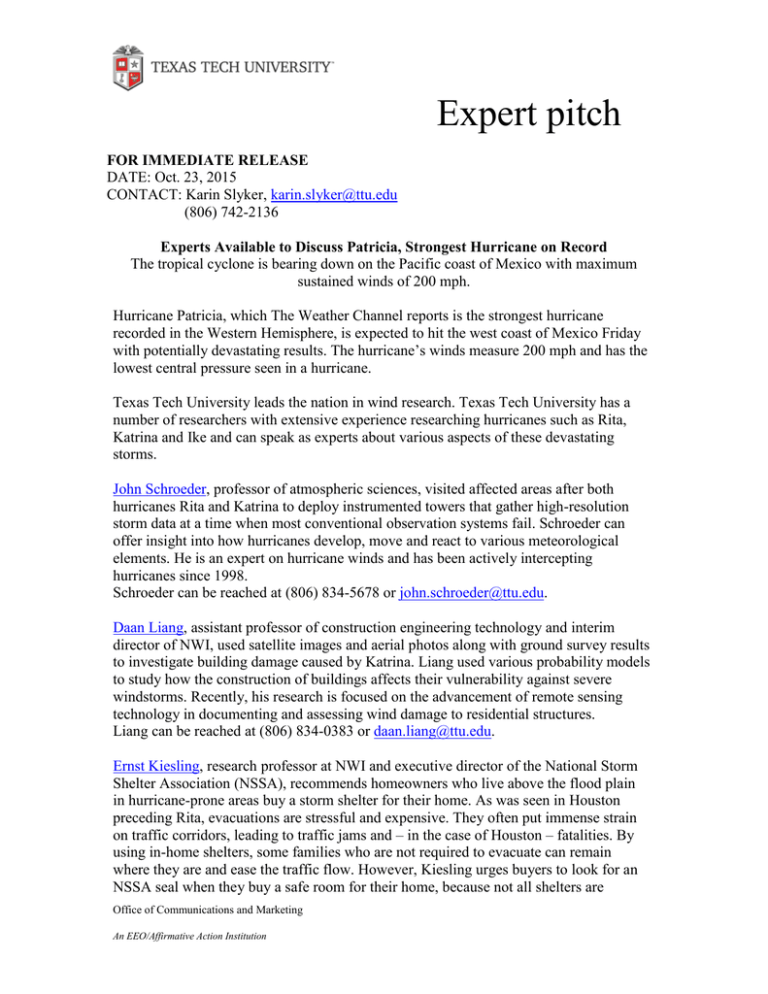
Expert pitch FOR IMMEDIATE RELEASE DATE: Oct. 23, 2015 CONTACT: Karin Slyker, karin.slyker@ttu.edu (806) 742-2136 Experts Available to Discuss Patricia, Strongest Hurricane on Record The tropical cyclone is bearing down on the Pacific coast of Mexico with maximum sustained winds of 200 mph. Hurricane Patricia, which The Weather Channel reports is the strongest hurricane recorded in the Western Hemisphere, is expected to hit the west coast of Mexico Friday with potentially devastating results. The hurricane’s winds measure 200 mph and has the lowest central pressure seen in a hurricane. Texas Tech University leads the nation in wind research. Texas Tech University has a number of researchers with extensive experience researching hurricanes such as Rita, Katrina and Ike and can speak as experts about various aspects of these devastating storms. John Schroeder, professor of atmospheric sciences, visited affected areas after both hurricanes Rita and Katrina to deploy instrumented towers that gather high-resolution storm data at a time when most conventional observation systems fail. Schroeder can offer insight into how hurricanes develop, move and react to various meteorological elements. He is an expert on hurricane winds and has been actively intercepting hurricanes since 1998. Schroeder can be reached at (806) 834-5678 or john.schroeder@ttu.edu. Daan Liang, assistant professor of construction engineering technology and interim director of NWI, used satellite images and aerial photos along with ground survey results to investigate building damage caused by Katrina. Liang used various probability models to study how the construction of buildings affects their vulnerability against severe windstorms. Recently, his research is focused on the advancement of remote sensing technology in documenting and assessing wind damage to residential structures. Liang can be reached at (806) 834-0383 or daan.liang@ttu.edu. Ernst Kiesling, research professor at NWI and executive director of the National Storm Shelter Association (NSSA), recommends homeowners who live above the flood plain in hurricane-prone areas buy a storm shelter for their home. As was seen in Houston preceding Rita, evacuations are stressful and expensive. They often put immense strain on traffic corridors, leading to traffic jams and – in the case of Houston – fatalities. By using in-home shelters, some families who are not required to evacuate can remain where they are and ease the traffic flow. However, Kiesling urges buyers to look for an NSSA seal when they buy a safe room for their home, because not all shelters are Office of Communications and Marketing An EEO/Affirmative Action Institution verified to be fully compliant with current standards for storm shelters and provide full protection from extreme winds. Kiesling has more than 35 years of experience in the design, standards-writing and quality control of storm shelters. Kiesling can be reached at (806) 834-1931 or ernst.kiesling@ttu.edu. Larry Tanner, research associate in civil engineering, completed a six-month investigation working with the Federal Emergency Management Agency mitigation assessment team on the wind damage to residential structures from Hurricane Ike in Texas and Louisiana. He also was a member of the FEMA mitigation assessment team that studied Hurricane Katrina. He led a team that recorded wind and water damage along the coastline in Louisiana and Mississippi. Much of the damage done by Katrina, he said, resulted from structures being built below the base flood elevation, or the elevation flood waters will rise during a 100-year storm event (meaning the storm only has a 1 percent chance of happening in a year). Tanner can be reached at (806) 834-2320 or larry.tanner@ttu.edu. Bradley Ewing, professor of operations management in the Rawls College of Business, has studied the economic impact of hurricanes and tornadoes. He can speak to the impact of hurricanes and tornadoes in cities like Oklahoma City; Corpus Christi; Wilmington, North Carolina; Miami, Florida; and Nashville, Tennessee. Ewing can be reached at (806) 834-3939 or bradley.ewing@ttu.edu. About the National Wind Institute The National Wind Institute (NWI), as it is now known, combines the former Wind Science and Engineering (WiSE) research center, which created the first doctorate in wind science and engineering, with the Texas Wind Energy Institute (TWEI), creator of the only bachelor of science degree in wind energy. NWI strengthens the university’s interdisciplinary approach to all things wind.
